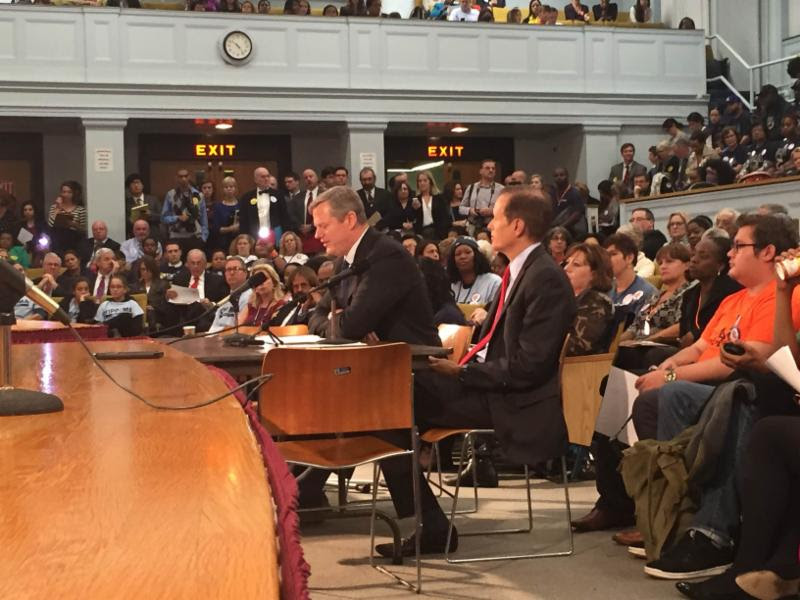 |
|
Governor Baker asks for more charters at the packed hearing, while Education Secretary Peyser looks on. Photo courtesy of State House News
|
A good number of communities — sadly, Boston not among them — presented a united front composed of union officials, school administrators, mayors, and school committee members who spoke against the removal of the cap. Mayor Marty Walsh spoke against the governor’s plan and in favor of a more modest expansion of charters.
The BTU and our community allies had dozens of people at the event, many of whom spoke. Read a WBUR report and the governor’s take.As part of our campaign against charters, we have completed two rounds of pass-through robo calls and sent targeted emails. Altogether over a two-day period, our members completed more than 1,400 pass through robo calls to their legislators and sent more than 500 emails. Thank you, thank you! If you’d like to send another email, it will take about 30 seconds. Email your legislator now.
If you’d like to make a phone call, call 617-722-2000 and ask for your legislator. Find out who your legislator is.
Commonwealth charters will drain more than $121 million this school year from our public schools. In the 2014-2015 school year, our district lost $104 million to Commonwealth charters. Under the governor’s proposal, the yearly loss will continue to grow. Looked at another way, the $121 million to be lost this year amounts to reduced resources of more than $2,000 for every student in the BPS.
What’s more, most charters do not act in the best public interest. They under-enroll students who are English language learners as well as those with special needs. Charters routinely counsel out students who are not a “good fit.” These practices deem them unworthy of public dollars. Please help our school system by emailing your legislator.
Read more information on charter myths and realities.
 |
|
Mozart teachers wear “Keep the Cap” stickers!
|
A few issues have arisen concerning substitute teachers.
Substitute teachers do not receive additional compensation for working an extended day. We are committed to changing that, as a priority, in the upcoming round of negotiations. The School Department could pay substitutes for their extra work, which depending on the school, could amount to anywhere from 30 minutes to three hours extra per day. But it has chosen not to — and it is paying a huge price as many extended day schools are having great difficulty in getting substitute teachers to work. That’s unfortunate, but the responsibility falls squarely on the school district.
Regardless of the difficulty, schools have an obligation to call for substitute teachers when regular teachers are absent. Here’s what the BTU-BPS contract says:
“It is the policy of the Committee that substitutes shall be hired to cover classes of regularly-assigned teachers when they are absent.” Page 33, 8 (b).
So what can one do?
If you are a teacher in a building and you lose a P & D because a substitute is not hired, causing you to cover an unscheduled class, then keep a log. The payment form comes out twice per year, and you are entitled to be paid at a rate of 1/5 of a per diem substitute teacher’s rate, which is currently $137.40 (or $27.48 per lost P & D), soon to be $141.52 ($28.30 per lost P & D).
What’s more, if you are in a school that makes no effort to find a substitute teacher for whatever reason, that’s a violation of the sentence above. Call the appropriate field representative. If you are told that you’re in an autonomous school and the school doesn’t have to call substitutes, ask to see the school’s election to work agreement for confirmation that the above sentence has been waived.
Please call the appropriate field representative with questions.